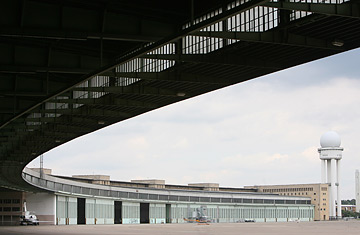
Tempelhof airport is expected to cease all flight operations by 2008. The airport, originally built in 1923, was redeveloped under Nazi rule into its present form.
The cavernous marble and sandstone halls of Berlin's Tempelhof Airport are mostly empty now. Only two of 20 check-in counters are open to attend to the handful of commuter flights that arrive and depart each day. But while passenger traffic has dropped 80% in the past decade, there is no lack of noise around the airport, which Adolf Hitler built in the late 1930s as a grandiose portal to his thousand-year Reich. The city's plan to close Tempelhof to air traffic later this year and turn it into a public park has run into unexpected turbulence from a coalition of leading businessmen, conservative politicians and urban nostalgists. In a referendum scheduled for April 27, Berliners will get a chance to weigh in on the fate of a landmark that has become, as Chancellor Angela Merkel recently said, "a symbol of the city's history."
The Tempelhof vote is one of the first under a new Berlin law authorizing plebiscites on local issues. (Germany's postwar constitution banned national referendums.) Garish billboards urging Berliners to SAVE TEMPELHOF! have sprouted alongside beds of daffodils and magnolia trees across the German capital. Posters that call for shuttering the "VIP airport" show children frolicking on the vacated fields. "Hands off Tempelhof!" croons gravel-voiced country singer Gunter Gabriel in a music video featuring air stewardesses in 1960s-vintage miniskirts. "Berlin is an anarchic city and everybody wants to join in the debate," says Wolfgang Kaschuba, a professor of urban studies at Berlin's Humboldt University.
The vote would be of only passing interest if not for the airport's history. Tempelhof's stern, monumental style was meant to trumpet the permanence of National Socialism. It outlived that twisted purpose to take on a more benign and, for many Berliners, vital role. When West Berlin was blockaded by Soviet troops in 1948 — 60 years ago this June — Tempelhof served as the city's sole lifeline to the West. Cargo planes, known as "raisin bombers," ferried in supplies — from potatoes to Hershey's chocolate bars — every three minutes around the clock for 15 months. The place became a symbol for the West's cold war resolve, which for Berliners culminated in John F. Kennedy's 1963 declaration: "Ich bin ein Berliner."
But Tempelhof's past has long since faded. As an underused commuter airport, it lost about $15 million last year. Shutting it down is a key part of Social Democratic Mayor Klaus Wowereit's plan to consolidate Berlin's three city airports into one by 2012. Proposals for repurposing the 890 acres (360 ha) in the heart of the capital range from establishing a German version of Central Park to turning it into grazing land for buffalo (really). Opponents gathered enough signatures in a citywide petition to trigger the referendum on the closure. Backed by prominent German businessmen, they say the airport is stimulating the local economy and that to pay for itself, parts of the Nazi-era arrival hall — still one of the largest freestanding buildings in the world — could be spun off for hotels and commercial use. Ronald Lauder, the U.S. cosmetics magnate, wants to save Tempelhof by turning it into a fly-in clinic for well-heeled patients from the Persian Gulf and elsewhere.
With slogans like "Tempelhof saved the Berliners, now Berliners can save Tempelhof," those who support the airport are expected to win the referendum. But its results are not binding, and Wowereit vows to press ahead with plans to shut the runways down no matter what the outcome of the vote.
Whatever happens over the next few months, Berliners are relishing the lively debate as a reassuring exercise in grass-roots democracy. It may have been built by a fascist regime, and seen its greatest moment when it was used to defy a communist one, but in the spring air, nearly 20 years after the Berlin Wall came down, the old airport is an apt reminder of the blessings of a democratic choice.
